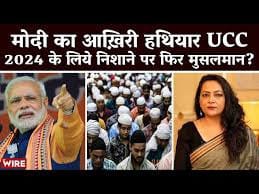AHMEDABAD: The Uniform Civil Code (UCC) has become the latest contentious policy perceived as part of a broader campaign against Muslims in India. The government’s aggressive push for UCC follows a series of moves, including the Ram Mandir verdict, criminalization of Triple Talaq, abrogation of Article 370, Citizenship Amendment Act (CAA), National Register of Citizens (NRC), the Hijab controversy, mob lynchings, and bulldozer actions. Critics argue that such measures serve political interests, consolidating Hindu-majority support while diverting attention from pressing issues like inflation, unemployment, corruption, and social welfare, asserts Umar Vohra, social activist based in Ahmedabad,in one of his recent articles.
Amid this climate, crucial national and international matters, such as the deportation of Indian nationals from the U.S. or the country’s stock market instability, receive little attention. Prime Minister Narendra Modi and Home Minister Amit Shah’s strategy is seen as one of continuous polarization, with Muslims bearing the brunt of an anti-minority narrative. The Rashtriya Swayamsevak Sangh (RSS) agenda is being aggressively advanced, with media playing a key role in maintaining this divisive discourse.
The UCC aims to establish a standardized set of personal laws governing marriage, divorce, inheritance, and adoption across all religious communities. While Article 44 of the Indian Constitution envisions UCC as a directive principle, its implementation has been delayed due to India’s diverse cultural landscape. Dr. B.R. Ambedkar, a key architect of the Constitution, emphasized the necessity of broad consensus before introducing such laws—something the current government appears to disregard. Instead, UCC is being tested at the state level, with Uttarakhand and Gujarat leading the way. A committee report from Gujarat is expected soon, but there is little indication that it includes representatives from minority communities, especially Muslims.
The BJP presents UCC as a step towards gender equality, citing the criminalization of Triple Talaq as an example of their commitment to women’s rights. However, critics argue that the move does not genuinely address Muslim women’s concerns, as Islamic law already provides them with certain protections, including rights embedded in marriage contracts. In contrast, issues like female foeticide, particularly prevalent in upper-caste Hindu households, remain overlooked.
The government claims that UCC will unify the nation by removing religious disparities, but in reality, it risks deepening mistrust and social divisions. Various political and social organizations, including the All India Muslim Personal Law Board (AIMPLB), Congress, Trinamool Congress (TMC), Samajwadi Party (SP), and Dravida Munnetra Kazhagam (DMK), have opposed its implementation. Legal experts argue that personal law reforms should emerge organically from within communities rather than being imposed through a top-down approach.
A glaring inconsistency in the BJP’s push for UCC is the selective targeting of Muslim personal laws while overlooking practices in other communities. Tribal customs, Jain religious practices like Santhara (ritual fasting to death), and other religious traditions remain untouched. This selective approach reinforces suspicions that the UCC is not about legal uniformity but rather a tool for deepening polarization and securing electoral gains.
Any reform in personal laws should stem from inclusive dialogue that respects India’s religious and cultural diversity. However, given the current political landscape, it is evident that UCC is less about national unity and more about leveraging religious fault lines for political advantage. Muslims are once again being positioned as scapegoats in this broader strategy of polarization.




